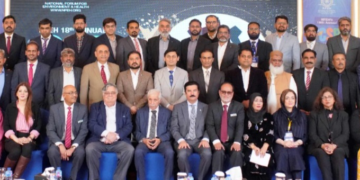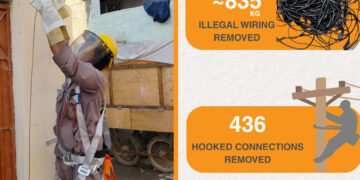Pakistan’s vision for a digitalized future is one that will enable the country to thrive through the immense potential of connectivity. A digital future will redefine societies, enabling growth and development, enhancing education and industry, and building new capacity for accelerating the economy.
Pakistan has been working tirelessly towards the development of its youth. This has been reflected by the adoption of the 2030 Sustainable Development Goals (SDGs), through which the country aims to activate a number of policies and actions that help empower and engage the youth for achieving the SDGs.
In line with this vision, Pakistan has launched initiatives, such as “Digital Pakistan”, that aim to empower the youth and enable them to become drivers of the country’s economic growth. Such initiatives are certainly establishing a strong base for the information and communications technology (ICT) ecosystem to thrive upon – but what we now need is to put our focus on Pakistan’s youth, to prepare them to take over and drive the country’s digital future.
Developing new skill sets for young people is something that is considered a priority in Pakistan. It also strengthens the ICT ecosystem, which will in turn contribute towards a stronger, digitally-driven economy – therefore investing in developing young ICT talents is a win-win situation that can only bring more benefits in the future, for everyone in Pakistan.
Numerous initiatives were organized in Pakistan, geared towards introducing young people to the ICT sector, educating them and enhancing their skills. These talent training programs include several ICT academies – including Huawei ICT Academies – and annual ICT competitions, amongst others.
Today there are several ICT academies across the country, launched in cooperation with renowned and prestigious universities. These academies operate in partnership with local educators and institutions, providing students with the opportunity to gain certification in some of the most relevant areas of ICT today. Courses at such institutions cover a wide range of technical fields, including routing and switching, storage, cloud, WLAN, cloud computing, big data, IoT, and artificial intelligence. To date, thousands of talented individuals have been trained and certified through these academies, providing them with the means to launch a career in the flourishing ICT industry. Even with the impact of COVID-19 and educational institutions closed as a result of the pandemic, students can access online training and certifications programs to continue learning.
In addition to that, annual ICT competitions have seen thousands of talented Pakistani college students participate in the past few years. These competitions aim to increase ICT knowledge, stimulate youths’ interest in learning and innovation capabilities, and improve their self-learning and problem-solving abilities.
With such immense potential amongst a young population, Pakistan is a goldmine of ICT talent. Harnessing this potential by making training and skills development opportunities accessible will ensure that the country has the best possible chance to not only realise its digitization ambitions, but to carry them forward for a brighter connected future for all.
ICT is playing a significant role in transforming economic activity. Considering its ongoing spread and importance for growth, developing ICT skills among the youth has major and tangible benefits on the advancement of the digital economy.
Fostering an open, shared, ICT talent ecosystem benefits all parties in Pakistan. Consequently, cultivating ICT talent that meets industry requirements and treating them as the most important resource helps in driving the development of multiple sectors and industries.
Huawei is committed to sharing knowledge and technology experience and nurturing local ICT talents based on its talent cultivation standards gained from years of operations in the ICT industry in more than 170 countries. This has helped in developing the next generation of local ICT talent to boost the digital economy. Huawei’s talent ecosystem aims to bridge the digital divide, develop local ICT talent, and fulfill corporate social responsibilities. This comes in line with the company’s efforts to support governments in achieving their goals of creating the future ICT leaders who will be responsible for achieving national targets and visions, and who will ultimately build a diversified and sustainable knowledge-based economy.



















